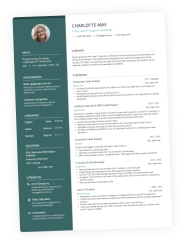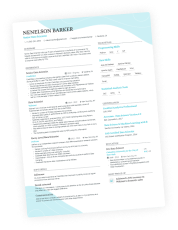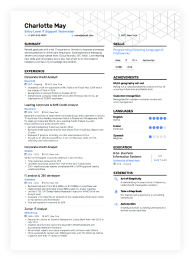If you're currently on the job market, you might have noticed a very common (let's call it) “recruitment trend” in regard to your CV.
A large percentage of adverts out there have a core, mandatory skill set that is quite similar for all candidates. Problem-solving; outside-the-box thinking; ability to work under pressure all make the list.
Perchance, you've also noted that amongst those basic skills, there is one that always remains in demand. No matter the industry or field - it is a necessity for the modern workforce.
Analysis skills are always prioritised towards the top of recruiters' checklists.
Now, how do you take your professional CV and shift its focus to showcasing your aptitude in the sphere of analysis?
Within this Enhancv guide, we'll discuss:
- What are analysis skills?
- Which other soft skills could hint at your analysis talents?
- How to spotlight your analysis skills within the CV summary?
- Curating different experience items to provide background to your ability to analyse information and data;
- Best CV sections to support your analysis skills.
What are analysis skills?
Analysis skills don't just hint at your ability to collect, systematise, and organise data. Going beyond the surface, this particular skill set focuses on the ability to contextualise information by carrying out various assessments and evaluations.
Analysis skills hint at your skills to think both creatively and logically to:
- identify patterns;
- interpret data sets;
- disclose solutions.
PRO TIP
By giving a new read-through of old numbers, candidates apt at analysis are ultimately able to:
- translate information for more data-driven decision-making;
- resolve specific problems and overcome various challenges;
- identify areas for growth and progress.
What is more, analysis is a type of soft skill. This basically means that it would be more difficult to perceive them from just your CV, as analysis isn't quite measurable (and tangible) in the same way a hard skill (e.g., SQL) would be.
That's why you'd have to be smart about curating different CV sections to hint at your abilities.
Why are analysis skills wanted by recruiters on your CV?
Critical thinking, problem-solving, and pattern detection are all part of what makes your analysis skills so invaluable to prospective employers.
Including this particular skill set on your CV would increase your marketability as a candidate for the particular role.
Hiring managers also care about your analysis skills, as those should ultimately build up your professional profile with values like:
1. Adaptivity and resilience
Your analysis soft skills hint you're able to respond to changes and challenges: whether role or industry-related.
Analysis skills should have helped you to build a variety of transferrable skills to always thrive ahead.
2. Effective, data-driven decision-making
Being able to sift and assess large data sets for patterns and trends certainly holds very dear value to the modern workplace.
You're able to thus come up with viable solutions from versatile perspectives, without falling into the traps of (sometimes, emotional) bias.
3. Problem-solving, innovation, and creativity
Analysis hints at candidates' ability to dissect specific problems to identify their root causes.
Exploring the issue from multiple angles and putting on their creative thinking caps, analysis skills help you set and deliver clear and tangible results.
The outcomes of the whole analytical process should derive (rational) solutions to overcome challenges and improve processes
4. Strategic planning and risk management
Another vital skill, which your analysis abilities go to prove, is your aptitude for assessing particular market landscapes.
Thus deriving stats and trends to support more optimised organisational planning across the board.
PRO TIP
Analysis skills are most highly sought out through various technology-focused fields, including:
- Data Science
- Programming
- Science
- R&D
- Engineering
- Finance
- Nursing
- Architecture
- Business Assessment
- Project Management
So, what are some of the soft skills you could include on your CV to prove your analytical skills?
Discover more in the next section of this guide.
What skills, activities and accomplishments help you highlight your analysis skills
In the age of cutting-edge technologies, information analysis has become one crucial element in the modern workplace.
Wondering which CV skills could help you better pinpoint your analysis skills?
Shine a better light on your talents by integrating various skills you'd potentially use all through the assessment process.
Identifying the problem
- Project management - to kick off any project, you'd need to be able to demonstrate your ability to strategise, allocate resources, and demonstrate the viability behind your suggested solutions.
- Research - examining what information is viable and necessary for you to derive successful outcomes to understand a complex topic, an industry or market trend, or your competitors is key. Within itself, research skills hold a variety of soft skills like hypothesising, time management, data collection, and organisation. Pinpoint your research skills using various papers or assessments you've made throughout your career.
- Evaluation and auditing - from the get-go, you'd need to be able to determine which sources are relevant, unbiased, and would help you to attain the wanted resolution.
- Pattern recognition - your ability to identify trends (e.g., customer buyer persona behaviours), the "next big thing", and critical events on the market would certainly support your analysis skill set.
- Attention to detail - to review information, pinpoint discrepancies, and ensure accuracy all through the assessment stages.
- Setting KPIs - how do you determine if the analysis process is a successful one? You'd need to determine the key project indicators (KPIs) that would affect your efforts all through.
- Observation and active listening - your ability to remain an unbiased observer, who respects the opinion of others, could be demonstrated all through your CV using various projects and responsibilities you've had.
Exploring perspectives
- Diagnostics - assessing the situation by relying on both rational facts (numbers) and different perspectives to determine the heart of the problem.
- Data analysis - the process of gathering, transforming, and interpreting large data (from various sources, e.g., spreadsheets or communication) to determine valuable insights. This would require the use of various tools and technologies, (e.g., Excel, SQL, statistical software) to extract actionable steps.
- Brainstorming vs. benchmarking - deriving various solutions and comparing those to previous competitor campaigns or available data.
- Creative thinking - thinking outside the box to provide new ideas, perspectives, and solutions to the current paradigm.
Finding solutions
- Forecasting and predictive modelling - foreseeing potential outcomes by assessing current data, trends, and patterns.
- Problem-solving - analysing the root cause of the problem and challenges (with data) to overcome obstacles with effective solutions. For example, your experience in supporting customers to resolve their issues with a particular software is the perfect example of problem-solving in action.
- Critical thinking - deriving solutions by breaking the issue down into more manageable (and actionable) steps. It's also the ability to consider different perspectives, facts assessment, and evaluate the pros and cons of different choices. Critical thinking is all about the logical links between ideas.
- Organisation and prioritisation - again, this goes hand-in-hand with your time management skills and your ability to efficiently sift through data.
- Collaboration - no man is an island, and within the analysis process, different perspectives play an invaluable role in determining the best outcomes. Use your CV to demonstrate how you've collaborated on different projects.
- Troubleshooting - this is an especially valid skill for more tech-heavy industries as it also pinpoints your proficiency with particular software (e.g. Linux).
- Testing and decision-making - data-backed experimentation plays a huge role in determining plausible solutions to specific problems. And, in the end, what would make your analysis experience most invaluable to employees is your thought process in the decision-making process.
Different types of assessments
Include CV examples of how you’ve integrated these types of assessments within your analysis process:
- Cost analysis
- SWOT analysis
- Quantitative analysis
- Qualitative analysis
- Competitor analysis
- Logical reasoning - to draw meaningful conclusions
- Adaptability - to meet different market challenges and ever-evolving environments.
Communication process
- Communication - the ability to assess and represent data in a clear, efficient, and easy-to-understand way.
- Feedback - the ability to deliver and receive both oral and written feedback (to feed-forward the process).
- Presentation - reporting and rationalising your suggested outcomes in a convincing manner. In the end, you'd aim to help your team or stakeholders understand your analysis skills.
- Data visualisations - using various tools (e.g., Photoshop, charts, MailChimp dashboards) to communicate in a simple and entertaining manner your findings.
- Influence - detail how your solutions have supported the growth of your team, company, or organisation.
How to demonstrate analysis skills on your CV
- Discover the precise analysis requirements that are vital for the role and tailor your CV to answer those.
- Demonstrate how your analysis skills have impacted your past workplaces via specific and quantifiable results.
- Use active, concise, and clear language to demonstrate how your ability to analyse data has contributed to the overall success.
- Don't overuse the "analysed" verb - instead use synonyms, whenever possible (e.g. assessed, researched, forecasted, etc.).
- The problem-solution is an excellent framework for your CV, where you detail the problem at hand and the analytical skills you've applied to address it.
One final note on how to list your analysis skills, make sure you've scattered those all across your CV sections in various contexts.
Example 1: Demonstrate analysis skills in the experience section
- •Tested and assisted in transferring +3K new analytical methods into the analytical science laboratory
- •Supported the Quality Control team in characterisation, non-routine analysis, and troubleshooting to determine the efficiency of +150 products”"Improved process efficiency by 65% by interpreting trends observed in proactive process analysis (PPA)
- •Provided practical problem-solving for +13 new projects/year
When writing your experience section, always keep in mind that past (or current) roles, where you've analysed trends, customer behaviour, and/or operational processes (or in this case proactive process analysis) are always valid.
Start off each CV experience bullet with an action verb (e.g., tested, improved, provided, etc.), followed by the skills you've used or the outcomes of your analysis efforts.
Ensure that the language you use is specific to your field and can provide further background as to your analysis capabilities.
Example 2: Demonstrate analysis skills in the CV summary section
Within your CV summary, it's important to put your analysis skills at the front and centre in an up-to-five-sentence format.
In this case, the candidate has focused on their analysis skill set to:
- improve processes by optimising strategies;
- brand message consistency via data-backed decision-making;
- cross-team collaboration for success.
Result-driven is always the formula for successful CV summaries, especially when it comes to analysis skills.
Example 3: Show your analysis skills in your achievements sections
Instead of just listing "analysis" all over the achievements section, the candidate has shifted the focus to their ability to:
- diagnose and streamline processes;
- understanding customer needs;
- troubleshooting and debugging.
Example 4: Demonstrate the skill through other sections of your CV
Creating your CV should reflect upon what you'd like your potential employers to remember about you. That's why including various other CV sections could even further support your analysis skill set.
So, make sure to include relevant sections, e.g.,:
- Projects and case studies - recent ones you've completed to demonstrate how you assess data for more informed decision-making.
- Education - relevant degrees, research, and/or coursework hinting at your ability to analyse, which would also fill the gaps in your CV (if you happen to have less experience).
- Certificates and courses - further accreditation in your assessment portfolio showcases that you remain up-to-date with the latest trends.
- Languages - especially if you have work experience in a multicultural environment, this would spotlight various soft skills, including your abilities to adapt, understand different situations, and solve problems.
Example 5: Use a separate skills section
One of the best ways to specify your analysis skills is to include information about the precise technology or tool you're apt at using.
Make sure to mention how you've used this as evidence of your skills.
Analysis skills: Key takeaways for your CV
- Analysis skills play a key role in your CV (and, subsequently, application) as they pinpoint a variety of skills needed for success within the workplace.
- Determine which analysis skills are most valued for the job and align those to your experience all through the analysis process.
- Always demonstrate specific examples of how you’ve used your analysis skills in the past with data or numbers to back up your claims.
- Scatter your analysis skills all over your CV to demonstrate your abilities through various prisms of your professional expertise and know-how.



